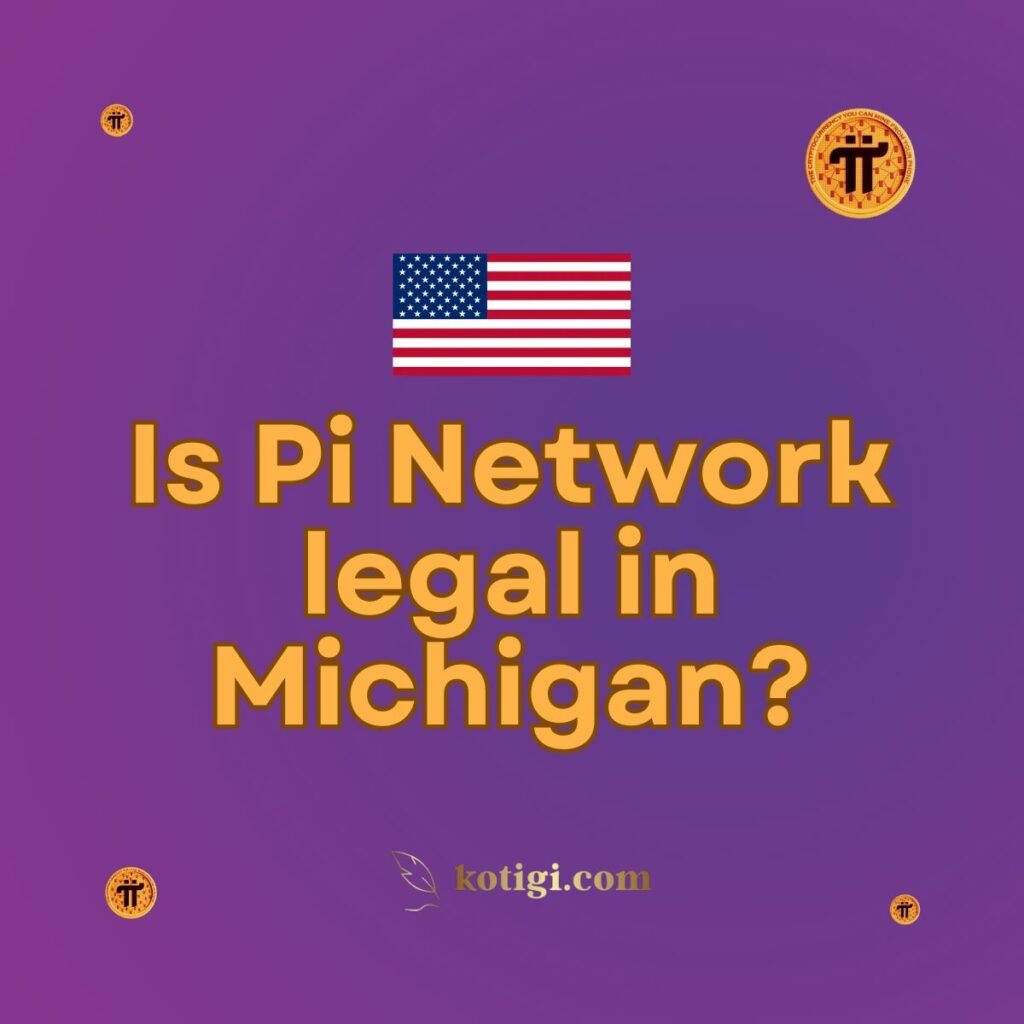
Is Pi Network legal in Michigan?
Yes, Pi Network is legal in Michigan. The legality of the Pi Network in Michigan, as in other jurisdictions, depends on compliance with cryptocurrency regulations and state laws governing digital assets. While there is no explicit regulation against Pi Network, users must ensure they operate within the framework of Michigan’s financial and digital laws.
Introduction
The question whether Pi Network is legal in Michigan arises as more individuals become interested in cryptocurrency and blockchain technologies. Pi Network, as a decentralized digital currency, operates globally, and the legality of its use can vary by region. In Michigan, there are no explicit laws prohibiting the use of Pi Network or other cryptocurrencies, but it’s essential to understand the broader legal landscape surrounding digital assets in the state.
This article explores the legal status of Pi Network in Michigan, offering an in-depth look at the regulatory framework governing cryptocurrency in the state, potential concerns, and how users can stay compliant.
Cryptocurrency Regulations in Michigan
Michigan’s Stance on Digital Assets
Michigan, like most U.S. states, doesn’t have specific laws targeting Pi Network or other cryptocurrencies. However, digital assets are subject to existing financial and securities regulations. The state’s regulatory framework is influenced by federal agencies like the Securities and Exchange Commission (SEC) and the Financial Crimes Enforcement Network (FinCEN).
How Cryptocurrency Is Classified?
In Michigan, digital currencies like Bitcoin and Pi are classified as property rather than legal tender. This classification means that cryptocurrency transactions may be subject to capital gains taxes, similar to how stocks are taxed. It’s essential for Pi Network users to keep track of their transactions for tax purposes.
SEC and Pi Network Compliance
Although Pi Network operates as a decentralized cryptocurrency, it is still subject to federal securities regulations if it’s viewed as an investment contract. The SEC has been active in monitoring cryptocurrencies that might qualify as securities under the Howey Test. For Michigan residents, this means understanding whether Pi coins are subject to these securities laws.
Consumer Protections for Pi Network Users
The Role of FinCEN
The Financial Crimes Enforcement Network (FinCEN) is responsible for enforcing anti-money laundering (AML) regulations across the U.S., including Michigan. Pi Network users in the state must ensure they adhere to AML requirements, especially if they plan to use Pi coins for commercial or financial activities.
Consumer Fraud Concerns
As with any digital currency, there is a risk of fraud or scams involving Pi Network. The Michigan Department of Attorney General regularly warns residents about potential cryptocurrency scams. Users should only engage with trusted and verified Pi Network sources and avoid sharing personal data on suspicious platforms.
The Importance of KYC Compliance
Know Your Customer (KYC) requirements are critical for cryptocurrency exchanges operating in Michigan. Pi Network users who wish to exchange Pi for other currencies may need to go through KYC verification. This process helps prevent fraud and ensures compliance with Michigan’s financial regulations.
Legal Implications for Pi Network in Michigan
Money Transmission Laws
Michigan requires businesses involved in cryptocurrency transactions to comply with the state’s money transmission laws. However, individuals using Pi Network for personal transactions are generally not required to obtain a money transmission license. Businesses, on the other hand, must ensure they are compliant with both state and federal regulations when dealing with digital currencies.
Impact on Pi Network Miners
Mining Pi Network coins in Michigan is not explicitly regulated, but users should be mindful of the energy consumption associated with mining and how that may impact their utility bills. Michigan’s energy policies may indirectly influence the feasibility of running mining nodes.
Taxation of Pi Network Transactions
Cryptocurrency transactions, including Pi Network coins, are subject to taxation under Michigan law. Users must report their gains or losses on transactions, as the IRS treats cryptocurrencies as taxable assets. This taxation applies whether users are mining, exchanging, or using Pi for purchases.
Pi Network’s Legal Future in Michigan
Potential for Future Regulation
Although Pi Network is currently legal in Michigan, the regulatory landscape surrounding cryptocurrencies is constantly evolving. As digital currencies gain more prominence, there could be new state or federal laws that directly impact the legal status of Pi Network in Michigan. It’s crucial for users to stay informed about any legal changes that might affect their ability to use Pi.
Compliance with State and Federal Laws
For Pi Network to remain compliant in Michigan, it must continue to operate within the bounds of both state and federal regulations. This includes adhering to anti-money laundering laws, ensuring user protection, and abiding by any future cryptocurrency-related legislation.
User Considerations When Using Pi Network in Michigan
Security Best Practices
Users in Michigan should prioritize the security of their Pi wallets and accounts. Following best practices such as enabling two-factor authentication (2FA), securing wallet passphrases, and avoiding phishing scams is essential for protecting digital assets.
The Role of Community and Support
Pi Network users in Michigan benefit from a strong community of Pioneers who share knowledge and support one another. Engaging with the local Pi Network community can provide valuable insights into the network’s development and legal status.
Understanding Market Volatility
As with all cryptocurrencies, the value of Pi coins may fluctuate. Michigan users should be aware of the inherent volatility in the cryptocurrency market and avoid making speculative investments without a clear understanding of the risks involved.
Conclusion
Pi Network is currently legal in Michigan, with no specific laws targeting its use. However, users must remain aware of existing financial regulations, tax obligations, and security concerns when using Pi coins. As the regulatory landscape evolves, it’s essential for Pi Network users in Michigan to stay informed about any changes that may affect the legality or usability of their digital assets.
Key Takeaways
- Pi Network is legal in Michigan under current state and federal laws.
- Cryptocurrency transactions in Michigan are subject to capital gains taxes.
- Pi Network users must comply with anti-money laundering (AML) regulations.
- Users should prioritize security and be aware of potential scams.
- Future regulation may impact the legal status of Pi Network in Michigan.





